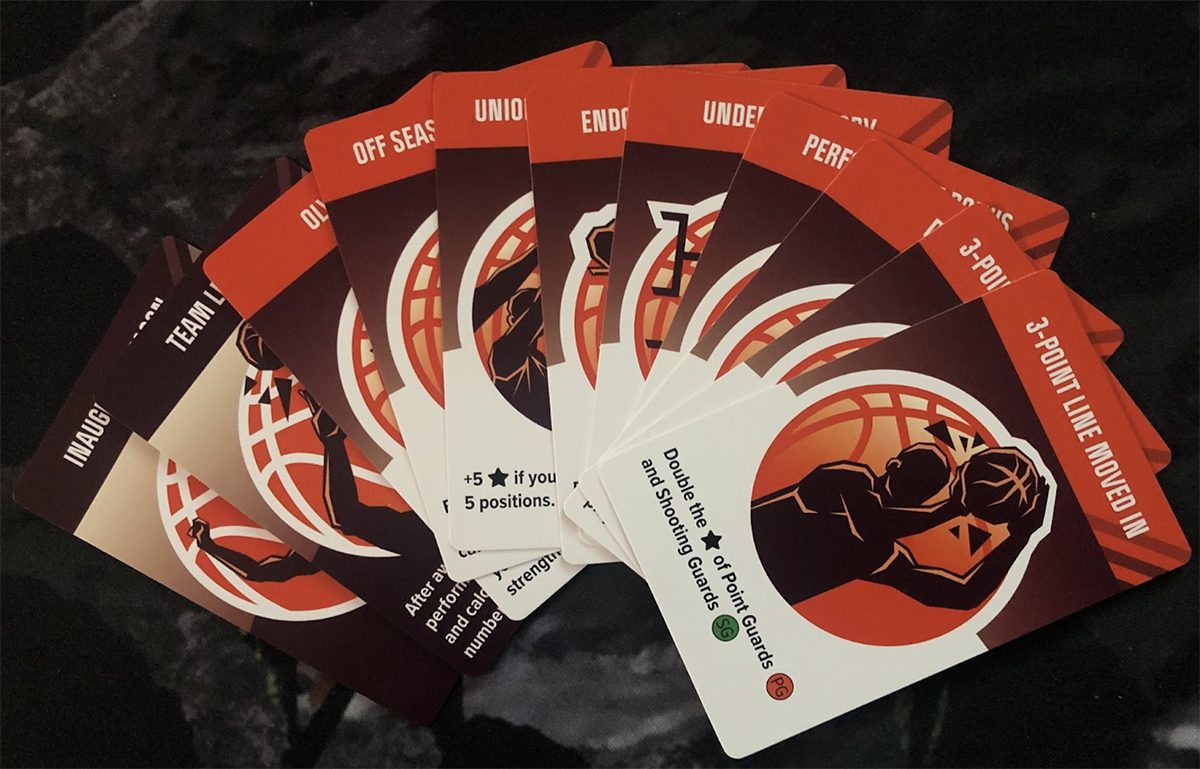Basketboss
About Basketboss
Basketboss is an auction game designed by Corne van Moorsel and published by Allplay (formerly Boardgametables.com). It's an auction game where you'll manage a team over several seasons, snapping up free agents as your players' talents ebb and flow during their careers.
Project Overview:
As Basketboss was first published in 2009, our development focused around updating the game to fit both a modern audience and the Allplay brand. When reviewing the original game there was one mechanism that clearly stood out: players aging over time. We wanted to polish the game to make that system really stand out.
This meant streamlining a lot of the bookkeeping and procedures of the gameplay, designing a new physical interface, and adding new content that increased the diversity of players' decision making when it came to aging players. For example, Basketboss originally had 7 phases within each game round and you updated your team strength multiple times. We were able to consolidate that down to 5 phases and have you update your team strength only once.

Instead of having players carefully line up their team on a standard board and then move a horizontal token down over them, the new edition uses multi-layered board that you push individual player cards into as they age, concealing information you no longer need. This new physical process for aging players not only looked great and was intuitive to players, but created design space that gave players choices about aging players individually by updating the design of the advisor abilities.
When updating a previously published game it is important to us that we keep whatever fans of the original publication enjoyed. Our goal is not to make changes just for the sake of change. One of the things that makes us proud about the reception of the new edition of Basketboss that most of the gameplay updates we implemented have not been directly noticed by fans of the original game. The game feels like the experience they remember from a decade before, even if in reality there has been a lot of modernization that is streamlining their gameplay.
Services Provided:
- Playtest Coordination and Analysis
- Gameplay Streamlining
- Content Design
- Usability
- Component Recommendations
- Modernizing Previous Publication
Case Study: Designing Gameplay Diversity
The most obvious new addition we added is the Season Cards. Often variable content is pigeonholed as being used to create more replayability in a game. It can do that, but that's not why we added this module. The season cards are focused on giving players interesting decision making consistently throughout the game.
Throughout our development process we were playtesting this game heavily. While we ended up happy with the streamlined round structure and the new components, one issue we kept seeing was every round, players were presented with the same puzzle and given the same tools to solve it. The story of their game didn't have an arc as the problem they were solving didn't change. The season cards were our solution to address this.

At the beginning of the game, a line of season cards is created, one card for each round of the game. The first and last cards are always the same, the first card providing no rules modifications and the final card telling you how to calculate the final score of the game. Every other season card is randomly drawn from a small deck with each card containing a small rules modification. These small tweaks now change the puzzle players are solving each round.
Since the cards are all revealed from the beginning of the game, players can craft a game-long strategy. Maybe you'll try to get a 2nd or 3rd place medal every season by matching the every season's card, or maybe you'll focus on having only 1 or 2 really high performing seasons? If you know Point Guards are going to be great in the 5th season why not contract them early when they are cheap and undervalued?

In the end, the season cards accomplished their primary goal of opening up new decision space over the course of a single game, but also had many other side benefits:
- Offers new puzzles for repeated game plays.
- Reinforces the endgame scoring so those rules were more consistently correctly applied.
- Tracks the game length so we didn't need another component to do that.
- Very budget friendly, as the cost of including 11 extra cards in a game that had cards less than a sheet of cards already was fairly negligible.
Brieger Creative Team
- Michael Dunsmore
- John Brieger